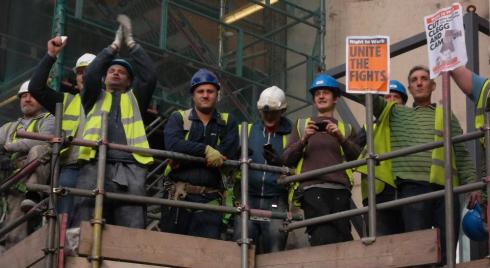Yesterday’s day of action in London might not have been as much of a landmark as previous protests, but this does not mean it requires less analysis in the aftermath. Indeed, perhaps it requires more.
The 9th November, a year on from Millbank, was billed as the event to reinvigorate the student movement and with occupations still ongoing in the city as well as the Sparks electricians and RMT taxi drivers also calling a day of action, the day had the potential to be very exciting. However in the event, police numbers proved too much and the day passed quietly and largely unreported.
Police numbers were massive: 4,000 officers were on duty for the march, the Met claiming one of their biggest public order events ever. In the run up to the day it was announced that baton-rounds would be on stand-by and warnings were given to known activists and school students to stay away. Even as activists arrived in London they faced harassment with student coaches being searched and arrests made on ludicrous grounds. With so much happening on the day and so many potential “flashpoints”, the police tactic was clearly to keep everything separate.
The electricians’ day of action started with the Sparks marching around central London, blockading roads including Bishopsgate, after which they eventually joined with an “official” demonstration called by Unite. Once again putting pressure on the union to follow the rank-and-file movement’s example of radical action, several hundred electricians refused to follow the agreed Unite march and instead tried to join up with the students. This was quickly kettled by police and despite efforts from students outside to break it, the Sparks were kept back. Meanwhile in Trafalgar Square, members of OLSX had broken through police lines and set up tents in the square. Though it seemed at first that they had won yet another occupied space, victory was short-lived as police arrested them after an hour, with the march and potential reinforcements a safe distance away. The march itself was supposed to pass the occupation at St. Pauls but before it could reach the camp the route was diverted down heavily policed roads, not allowed even near St. Pauls, and into a semi-kettle at Moorgate. With only one exit and several units dotted along the road it led to, the police made sure that the marchers wouldn’t leave en masse for the Finsbury Square occupation or to any other part of the city.
This may not have been the headline-grabbing success we’d wanted but it does highlight some very important things about the state of play. Firstly, it’s been said before but deserves reiterating: everything has changed since Millbank. It seems almost inconceivable now that only a year ago police thought just a handful of officers would be enough for tens of thousands of student marching through London. The expectation from both sides that something can happen on any demonstration now is a massive shift in itself. Not that long ago “minor scuffles” and 60 arrests would have been enough to provoke upset and condemnation from newspapers, now they’re so par-for-the-course it’s hardly worth reporting. The fact that so many police and such a big operation are now needed for a relatively small protest is a victory in itself and it’s reasonable to question just how many demonstrations the resources of the Met can keep that level of policing up for.
More importantly though in being so successful on Wednesday the police have exposed their biggest fear: that all these apparently different issues and protests should collide with each other in an act of solidarity. We should remember then that whatever particular situation, organisation, struggle or action we might be involved in it is part of something bigger. OLSX, the students or the Sparks are not wholly the movement but just a part of the movement and get their strength from acting together. With the Occupy movement, the riots and student protests last year as well as the Sparks and other rank-and-file campaigns we’re seeing that spontaneity and new networks and forms of organisation are able to grow that we can mobilise around. In the run up to the strikes at the end of the month we need to organise despite divisions of union, industry, sector or workplace. We need to go further than the slogan “students and workers unite” and instead realise that we are all workers, even if some of us are workers-in-training.
Formalised methods of taking up disputes are designed to limit our actions, but the Sparks and the Occupy movement have shown that we can act around these limitations. If you’re not unionised or not out on the 30th book the day off or pull a sickey to strike informally, or find out from your union about support they might give you for not crossing another unions picket. We can support each other by meeting together to plan actions and in Leeds strike meetings are taking place between lecturers, support staff and students on both the University and the Met’s campuses (check out Leeds EAN for more details). The Sparks campaign will be coming to Leeds, holding their first meeting in November and this Friday Leeds will join in the Occupy movement. In The Space Project, being run by us at Really Open University, we will have meetings around issues that affect us all and inviting people to think about how we deal with them collectively.


